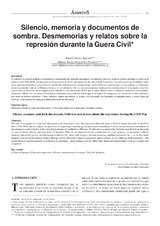Mostrar el registro sencillo del ítem
Silencio, memoria y documentos de sombra. Desmemorias y relatos sobre larepresión durante la Guera Civil
| dc.contributor.author | Cabana Iglesia, Ana | |
| dc.contributor.author | Nogueira Pereira, María Xesús | |
| dc.date.accessioned | 2015-09-16T07:54:39Z | |
| dc.date.available | 2015-09-16T07:54:39Z | |
| dc.date.issued | 2014 | |
| dc.identifier.issn | 1575-2100 | |
| dc.identifier.issn | 2386-4494 | |
| dc.identifier.uri | http://hdl.handle.net/10396/12903 | |
| dc.description.abstract | El objetivo de nuestro trabajo es acercarnos a la memoria de un hecho traumático, la represión que tuvo lugar en Galicia durante los años de la guerra civil (1936-1939). Indagaremos en los procesos de olvido, de narración, de selección de recuerdos y reconstrucción que ha habido sobre aquel episodio traumático que puede ser considerado en términos de «desmemoria» social. Para ello, analizaremos el caso gallego, y lo haremos desde el punto de vista de la Historia Social y de la Literatura. Esto es, nos interesaremos tanto por la construcción de la memoria social (en oposición a la memoria oficial impuesta por el poder) y las narraciones de las que se nutre (llenas estas de silencios, memorias fraccionadas, memorias tullidas, etc.) como por la memoria construida a través de los relatos que de la represión franquista y de sus efectos se han elaborado por parte de autores literarios. Como veremos, ambas memorias, la social y la construida vía literatura, comparten trazos y están llenas de silencios y desmemorias, aunque también jalonadas de denuncia. | es_ES |
| dc.description.abstract | The aim of our paper is to approach the memory of a traumatic event - the repression that took place in Galicia during the years of the Civil War (1936-1939). We investigate the processes of forgetting, of narrating, of selection of remembrances and of reconstruction undertaken for that traumatic event which is to be considered in terms of «collective oblivion». To this end, we analyze the Galician case both from the point of view of Social History and from that of Literature. Thus we are interested in the construction of social memory - as opposed to official memory imposed by power - and the narratives that feed it - filled with silences, divided memories, mutilated memories etc. –, as well as in the memory constructed by literary authors through stories about the Francoist repression and its effects. As we shall see, both memories – the social memory and the memory constructed via literature - share features and are filled with silence and forgetfulness, but also dotted with complaint | es_ES |
| dc.format.mimetype | application/pdf | es_ES |
| dc.language.iso | spa | es_ES |
| dc.publisher | Asociación de Estudios de Ciencias Sociales y Humanidades | es_ES |
| dc.rights | https://creativecommons.org/licenses/by-nc-nd/4.0/ | es_ES |
| dc.source | Ámbitos (32), 15-26 (2014) | es_ES |
| dc.subject | Memoria colectiva | es_ES |
| dc.subject | Represión franquista | es_ES |
| dc.subject | Olvido | es_ES |
| dc.subject | Transmisión de la memoria | es_ES |
| dc.subject | Literatura gallega | es_ES |
| dc.subject | Collective memory | es_ES |
| dc.subject | Francoist repression | es_ES |
| dc.subject | Oblivion | es_ES |
| dc.subject | Transmission of memory | es_ES |
| dc.subject | Galician literature | es_ES |
| dc.title | Silencio, memoria y documentos de sombra. Desmemorias y relatos sobre larepresión durante la Guera Civil | es_ES |
| dc.type | info:eu-repo/semantics/article | es_ES |
| dc.rights.accessRights | info:eu-repo/semantics/openAccess | es_ES |

